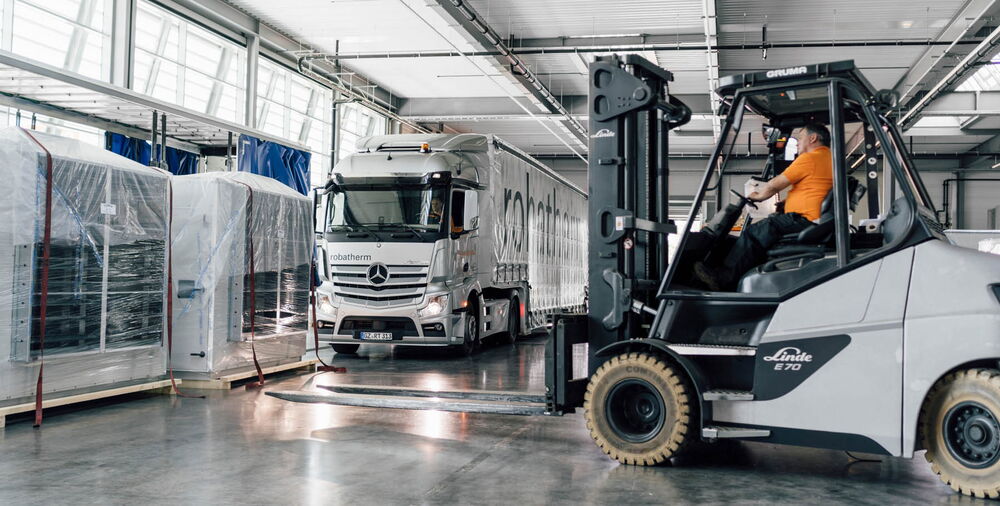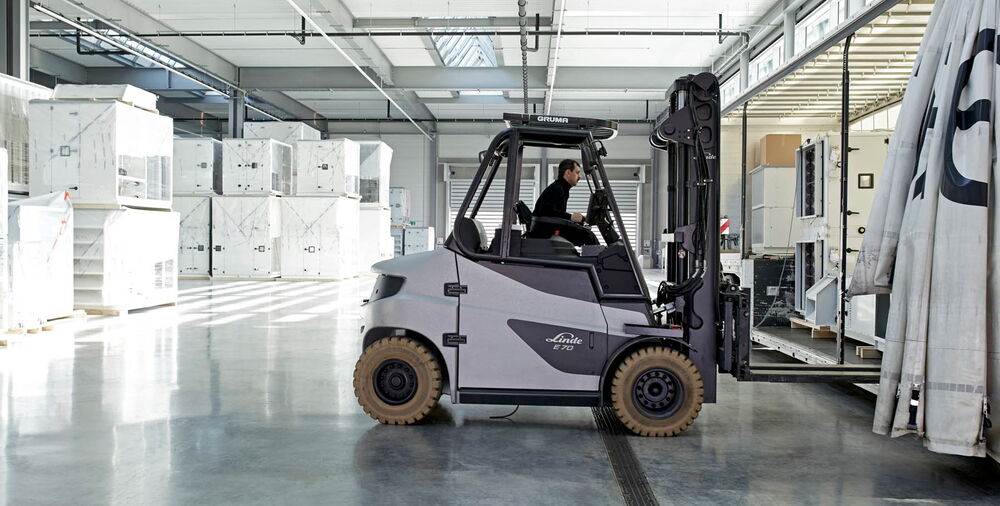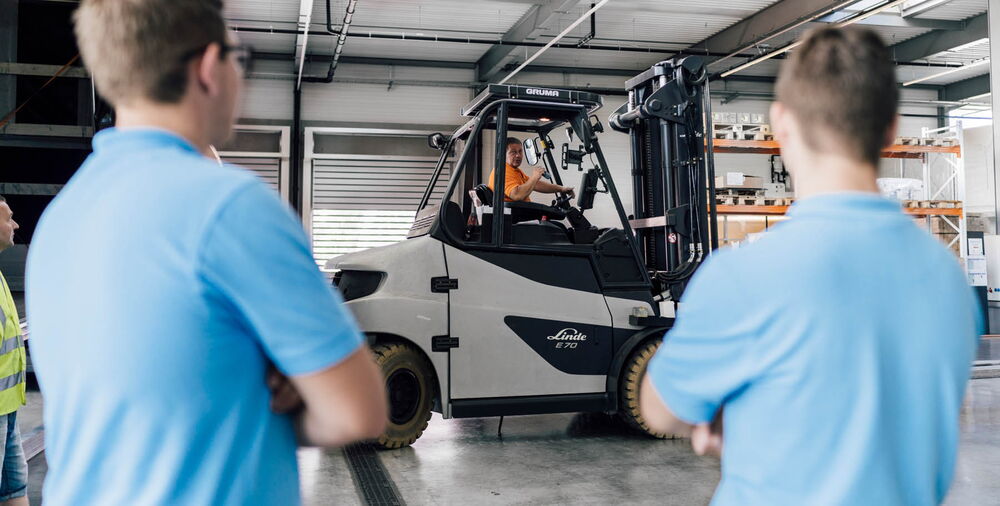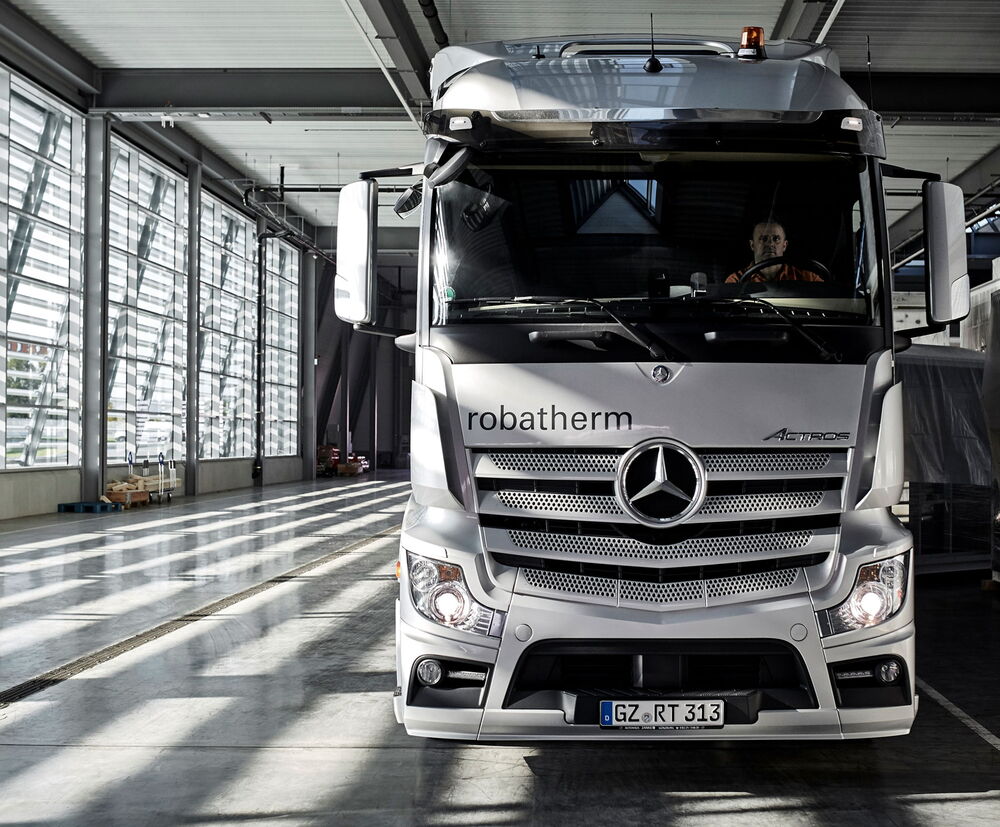Hurdle Race against Time and Space.
In an interview, Thomas Zöschinger, Head of Outgoing Goods, outlines the tense situation prevailing in the transport industry.

Hygienically packaged and at the destination on time? Yes, it’s a matter of course when it comes to supplying our air handling units. However, the complex logistics sector has turned into highly challenging terrain. In a conversation, Thomas Zöschinger illustrates his daily fights with uncertainties. He openly addresses what has changed. Where obstacles are in the way – and how robatherm overcomes them professionally.

Interview
Your tasks and objectives in shipping are, after all, quite clear: Everything should arrive on time and undamaged to the customer. So what has changed in the past few years?
Thomas Zöschinger: „That‘s quite a lot to cover. But, of course, the pandemic has presented new challenges. The changing entry and quarantine regulations pretty much throw our well-planned processes into disarray. Interrupted supply chains and delayed arrivals of parts make life difficult for us.“
What does that actually mean for the outgoing goods department?
Thomas Zöschinger: „In addition to regular shipments of our AHUs and spare parts, the rate of follow-up shipments is growing. As a result, we have to additionally package and ship. This means a lot of extra work for us – and constant rescheduling. But, unfortunately, that‘s already a part of their everyday business in the outgoing goods department.“
All processes at robatherm focus on on-time delivery of air handling units. And the changed conditions impact precisely this critical factor – the shipping. A monumental task?
Thomas Zöschinger: „That sums it up quite nicely. Think of it like this: We precisely planned and coordinated each step of the process so that we could deliver on time to the construction site. Unpredictable traffic conditions, such as traffic jams and breakdowns, have occurred before. But recently, further hurdles have been waiting in the wings. Especially those over which we have little or no control.“
Can you give us an example?
Thomas Zöschinger: „Unfortunately, short-term absences of truck drivers and vehicles are now becoming the order of the day.“
That makes sense. Corona probably doesn‘t make the situation any easier either?
Thomas Zöschinger: „That‘s the way it is, and the pandemic-related workload adds up: On the one hand, quarantine and entry regulations complicate dispatching. On the other hand, we have to allocate more time for loading and unloading due to safety precautions. Clearly, overall conditions in the transport sector have become significantly more complicated. Fortunately, we are very well prepared so that everything generally arrives on schedule and safe and sound.“

Judging by that, you might think that back-dated appointments would be a relief for you, wouldn‘t you?
Thomas Zöschinger: „y no means. Because what is regrettably becoming more frequent are profound deadline shifts. Often for several months. The main problem is the spatial capacities, which are actually very comfortably dimensioned at robatherm. Our Jettingen-Scheppach plant has an entire hall dedicated to weather-proof storage and the loading of the cleaned, hygienically packaged equipment for transport. Now you can imagine what happens when schedules are postponed: Units ready for transport now take up the space needed for the subsequent new units.“
At some point, things start getting pretty tight. With which consequences?
Thomas Zöschinger: „We already plan very conscientiously. But in case of long-term postponements, the respective AHUs need to be temporarily stored in a place where they won‘t be in our way all the time. And the more they pile up, the more frequently we need to move them – after all, we want to get the units loaded on time, as soon as it‘s their turn to be shipped.“
Isn‘t the commodity and transportation situation very tense all over?
Thomas Zöschinger: „Absolutely! We don‘t just want to ensure that the air handling units are moved from A to B. Transport and delivery has to meet our quality requirements without any gaps. Since we expect exceptionally high reliability, we are only able and willing to work with selected freight forwarders – which leads us to the next problem …“
And what would that be?
Thomas Zöschinger: „Well, the entire logistics market is turbulent right now. Besides all the uncertainties along the land route, maritime traffic is also starting to flounder. Empty containers have been in short supply for quite some time. On the other hand, empty trucks are available, but qualified drivers are lacking. On top of that, fuel prices are going through the roof, driving up transportation costs. It takes a really great team to keep things on track here and it‘s reassuring to know that I can count on my fellow employees.“
Presumably, these circumstances also require you to compromise often?
Thomas Zöschinger: „Above all, we need to set priorities. Customer satisfaction is, after all, always at the top of that list. And the general conditions are as they are. For example, we always try to ensure that those truck drivers we engage also speak the language spoken at the destination. Unfortunately, that doesn‘t always work out in the current situation. Experience shows that timely delivery is far more critical to our customers. So when in doubt, we would rather deliver on time in Spain than wait for a driver who speaks Spanish.“

You describe impressively how many hurdles there are to simultaneously overcome in the logistics sector. But does that even leave room for broader issues such as sustainability?
Thomas Zöschinger: „Wherever possible, we also pay attention to sustainable processes. Not only by using electric forklifts. But also, for example, in avoiding waste and recycling packaging materials such as chips or wooden quick-snap boxes. In addition, by optimizing transport planning, we can minimize the number of trucks needed, reducing emissions.“
Nevertheless, many trucks depart daily from robatherm‘s outgoing goods department. Doesn‘t that contradict the current pursuit of greater sustainability?
Thomas Zöschinger: „Of course, there is always room for improvement. But I can assure you that we divide the transport volume into as few trucks as possible. By the way, this also reduces costs. The vehicle sizes we select are generally based on the space required, thus avoiding empty cargo space. One parameter for this is also bundling deliveries to our international partners. The order reads: Get trucks on the road as fully loaded as possible.“

Does that always work?
Thomas Zöschinger: „For the most part, yes. However, if we can no longer influence certain conditions, sustainable transport becomes more difficult. For example, when customers demand just-in-sequence delivery. Specifically, this means that a suitable unit part should always be deliverable for the corresponding assembly sequence. Consequently, we can no longer optimize the space available to divide the equipment parts among the trucks. Still, instead, we have to accommodate the assembly process at the destination. Naturally, this counteracts our efficient planning.“
There are often calls for more goods to be transported by rail. Would this be a feasible alternative for robatherm?
Thomas Zöschinger: „In principle, this is a reasonable request. However, as far as robatherm is concerned, it is an ideal supplement, yet not an alternative. Because in many cases, the equipment is simply too large for rail transport in a container. In addition, virtually no construction site has rail access. Therefore, such an alternative would not be suitable for robatherm, even though we are located directly on the Ulm - Augsburg railroad line.“

Does that mean rail transport is barely relevant for robatherm?
Thomas Zöschinger: „On the contrary! We actually work very intensively with the nearby container station. As conditions permit, we load containers with air handling units and material here at the plant. After a short haul by road, the cargo is loaded onto a freight train – and, if necessary, then transported onward aboard a ship. However, at the destination, we again need the truck for the last meters to the customer.“
Can you say approximately how many rail trips robatherm carries out?
Thomas Zöschinger: „The number varies quite a bit. For example, in 2020, it was just under 700 containers, meaning that we ultimately shifted 700 long-haul truck journeys from the road to the railways. We‘re not only doing rather well with that, but we‘re also doing it quite sustainably.“